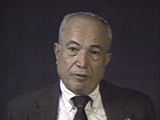You searched for: ���������������������������������������������fuk7778���your
<< Previous | Displaying results 41-50 of 163 for "���������������������������������������������fuk7778���your" | Next >>
-
Lily Mazur Margules describes the dehumanization she felt in the Kaiserwald camp
Oral HistoryLily was forced into a ghetto after the Germans occupied Vilna in 1941. She was forced to work until the liquidation of the ghetto in 1943 when she was deported to the Kaiserwald camp near Riga, Latvia. From there she was sent to work in the Duenawerke labor camp. She was deported by ship across the Baltic Sea to the Stutthof camp and was taken to a nearby labor camp. Lily was liberated during a death march which ended in the town of Krumau, East Prussia, in 1945.
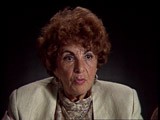
-
Leo Melamed describes life as a refugee
Oral HistoryLeo was seven years old when Germany invaded Poland in September 1939. Before the war, Leo's father was a mathematics teacher and member of the Bialystok City Council. Fearing arrest, Leo's father fled Bialystok for Vilna just before the German occupation. Leo and his mother eventually joined his father in Vilna. After the Soviets occupied Vilna, Leo's father obtained transit visas to Japan. The family left Vilna in December 1940, traveled across the Soviet Union on the Trans-Siberian Express, and arrived…
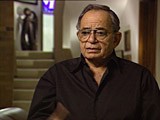
-
Preben Munch-Nielsen describes the Danish people's responsibility to help their Jewish fellow citizens
Oral HistoryPreben was born to a Protestant family in Snekkersten, a small fishing village. The Germans invaded Denmark in 1940. Preben became a courier in the resistance. When the Gestapo (German Secret State Police) began hunting down Jews in Denmark in October 1943, Preben helped hide refugees in houses near the shore and led them to boats which took them to Sweden. Preben himself had to take refuge in Sweden in November 1943. He returned to Denmark in May 1945.
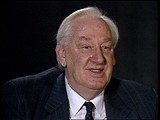
-
Bella Jakubowicz Tovey describes conditions in Bergen-Belsen
Oral HistoryBella was the oldest of four children born to a Jewish family in Sosnowiec. Her father owned a knitting factory. After the Germans invaded Poland in 1939, they took over the factory. The family's furniture was given to a German woman. Bella was forced to work in a factory in the Sosnowiec ghetto in 1941. At the end of 1942 the family was deported to the Bedzin ghetto. Bella was deported to the Graeben subcamp of Gross-Rosen in 1943 and to Bergen-Belsen in 1944. She was liberated in April 1945, and…
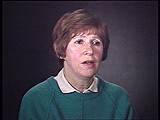
-
Franz Wohlfahrt describes imprisonment in Graz
Oral HistoryFranz and his family were Jehovah's Witnesses. Germany annexed Austria in 1938. After World War II began, Franz's father was executed because, as a Witness, he opposed war. In 1940, Franz refused to participate in military training and would not salute the Nazi flag. He was imprisoned, interrogated by the Gestapo (German Secret State Police) in Graz, and sentenced to five years of hard labor in a camp in Germany. Franz was liberated by US forces in 1945.
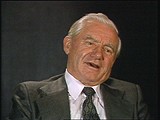
-
Beifeld album page titled "Mementos"
ArtifactCollage entitled: "Mementos from the Russian campaign," which includes a watercolor of Stalin with the caption: 'Russia a meeting place for foreigners 1942-43' (top); a commuter train ticket issued to military personnel who carried the special SAS [Hurry, Immediate, Urgent] draft notice (middle, right); a pseudo travel brochure cover entitled 'Spend your summer vacation in merry Russia' (bottom, left); and the original design for the cover of the labor company's journal entitled 'Hungarian Royal 109/13…
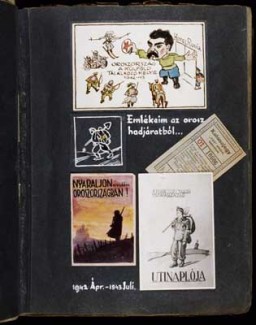
-
On the waiting list for American visas
DocumentSelmar and Elsa Biener joined the waiting list for US immigration visas in September 1938. Their waiting list numbers—45,685 and 45,686—indicate the number of people who had registered with the US consulate in Berlin. By September 1938, approximately 220,000 people throughout Germany, mostly Jews, were on the waiting list.
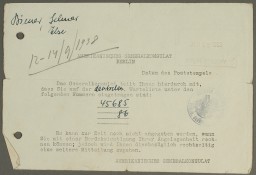
-
Leah Johnson
ArticleRead the Jewish Partisan Educational Foundation's short biography of Leah Johnson.
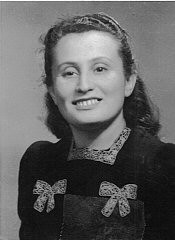
-
Abba Kovner
ArticleRead the Jewish Partisan Educational Foundation's short biography of Abba Kovner.
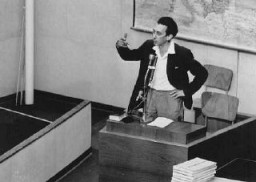
-
Saul Ingber describes forced labor and brutality in the Gusen subcamp of the Mauthausen concentration camp
Oral HistorySaul grew up in a religious Jewish family. He was trained as a tailor. In 1939 he was sent to forced labor along with most of the young men of his town. He worked in many different labor camps before being deported to the Mauthausen concentration camp system in 1944. While working there, Saul's hand was broken by an SS guard. He eventually ended up in the hospital in the Dachau camp. He was liberated by US troops in May 1945. After the war he returned to his hometown and was reunited with his sister. They…
